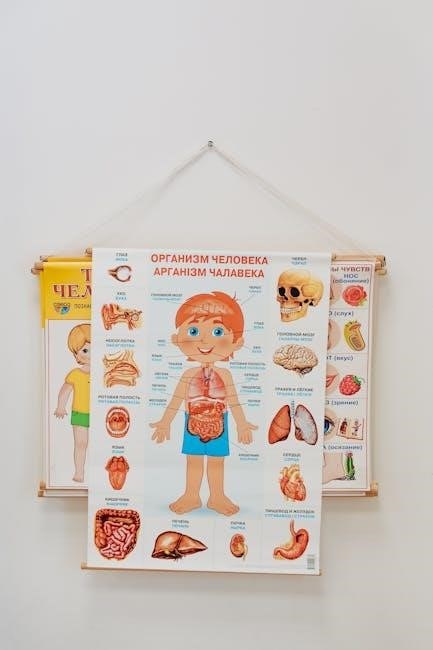A Certified Health Education Specialist (CHES) is a professional who promotes health education and disease prevention․ The certification, administered by the National Commission for Health Education Credentialing (NCHEC), validates expertise in health education and promotion․ CHES professionals work in various settings, including schools, hospitals, and community organizations, to improve health outcomes and empower individuals․ This certification is essential for advancing public health initiatives and addressing health disparities effectively․
1․1․ Definition and Overview of CHES Certification
The Certified Health Education Specialist (CHES) certification is a professional credential awarded to individuals who demonstrate expertise in health education and promotion․ Administered by the National Commission for Health Education Credentialing (NCHEC), it validates knowledge in the Seven Areas of Responsibility, including needs assessment, program planning, and evaluation․ CHES professionals are equipped to address health disparities and promote well-being in diverse settings․
1․2․ Importance of CHES Certification in Public Health
The CHES certification is crucial in public health as it ensures professionals are equipped to address health disparities and promote disease prevention․ By validating expertise in health education, it empowers individuals to design effective programs, fostering healthier communities․ CHES-certified professionals play a vital role in advancing public health initiatives, making it a cornerstone for improving population health outcomes and equity․

Eligibility Requirements for the CHES Exam
To qualify for the CHES exam, candidates must hold a bachelor’s degree in health education or a related field and complete relevant coursework․ Additional requirements include applicable work experience or academic preparation aligned with the National Commission for Health Education Credentialing (NCHEC) standards․ Meeting these criteria ensures candidates are well-prepared for the certification process․
2․1․ Educational Background and Degree Requirements
Earning a bachelor’s degree in health education or a related field, such as public health or health promotion, is essential․ Coursework should include subjects like health promotion, program planning, and research methods․ A degree from an accredited institution is typically required to qualify for the CHES exam, ensuring a strong foundation in health education principles․
2․2․ Work Experience and Skills Needed
While formal work experience is not always required, practical skills in health education are crucial․ Candidates should demonstrate proficiency in program planning, communication, and community engagement․ Experience in developing educational materials or conducting health assessments is beneficial․ Strong analytical and interpersonal skills are essential for effectively promoting health initiatives and collaborating with diverse populations․
Exam Format and Content
The CHES exam assesses knowledge across the Eight Areas of Responsibility for health educators, featuring 165 multiple-choice questions․ Candidates have three hours to complete it․
3․1․ Overview of the CHES Exam Structure
The CHES exam consists of 165 multiple-choice questions, divided into two sections: 125 scored questions and 40 unscored pretest questions․ The exam assesses competencies across the Eight Areas of Responsibility, including needs assessment, planning, implementation, and evaluation․ Candidates have three hours to complete the exam, which is administered via computer․ The structure ensures a comprehensive evaluation of health education skills and knowledge application․
3․2․ Key Competencies and Areas of Responsibility
The CHES exam evaluates eight key competencies, including needs assessment, program planning, implementation, and evaluation․ Professionals must demonstrate skills in communication, cultural competence, and community engagement․ These areas ensure CHES specialists can effectively design and deliver health education programs, addressing diverse population needs and promoting positive health behaviors․ Mastery of these competencies is vital for successful practice and certification․
3․3․ Question Types and Time Allocation
The CHES exam features multiple-choice questions and scenario-based problems, testing practical application of health education skills․ Candidates have 3 hours to complete 165 questions, focusing on key competencies like program planning and evaluation․ Effective time management is crucial, with strategies like skimming questions and allocating extra time for complex scenarios recommended to ensure thorough responses․
Study Materials and Resources
The CHES study guide includes recommended textbooks, online courses, and practice exams․ These resources help candidates understand key concepts, competencies, and structured study plans effectively․
4․1․ Recommended Textbooks and Study Guides
Popular textbooks include Health Education: Creating Strategies for School and Community Health and Health Promotion and Education Research Methods․ Study guides like the National Commission for Health Education Credentialing (NCHEC) handbook provide detailed outlines and practice questions․ These resources cover key competencies, exam formats, and real-world applications, ensuring comprehensive preparation for the CHES exam․
4․2․ Online Courses and Practice Exams
Online courses from platforms like Coursera and Udemy offer comprehensive CHES exam preparation․ Practice exams provided by the National Commission for Health Education Credentialing (NCHEC) simulate real test conditions․ These resources include interactive modules, case studies, and live Q&A sessions, ensuring candidates are well-prepared for the exam format and content․ They also provide detailed feedback to improve understanding and retention․

Preparation Strategies for Success
Develop a structured study plan, focusing on weak areas and active learning techniques․ Utilize practice exams to assess readiness and refine test-taking skills․ Stay updated on industry changes to ensure relevance and effectiveness in your preparation journey․ Consistency and dedication are key to achieving success in the CHES exam․
5․1․ Creating a Study Plan and Schedule
Create a structured study plan tailored to your learning style, focusing on areas needing improvement․ Break down study material into manageable sections, setting specific goals for each session․ Allocate time for each competency area, ensuring balanced preparation․ Regularly review and practice with sample questions to reinforce learning․ Use a planner or app to track progress and stay consistent․ Adapt the plan as needed to maintain effectiveness․
5․2․ Tips for Effective Learning and Retention
Engage in active learning by self-quizzing and summarizing key concepts․ Use spaced repetition to review material over time, enhancing long-term retention․ Incorporate mnemonics and visualization to remember complex information․ Prioritize understanding over memorization, as the CHES exam tests application of knowledge․ Teach concepts to others to reinforce your own understanding․ Stay organized, rested, and nourished to optimize cognitive function․

The Certification Process
To become a Certified Health Education Specialist, you must earn a relevant degree, prepare thoroughly, and pass the CHES exam administered by NCHEC․ This process validates your expertise in the Eight Areas of Responsibility, ensuring you are well-equipped to promote health education effectively․
6․1․ Registering for the Exam
Registering for the CHES exam involves submitting an application through the National Commission for Health Education Credentialing (NCHEC) website․ Ensure you meet eligibility criteria, such as a bachelor’s degree in health education or a related field, and pay the required fee․ Once approved, you’ll receive an eligibility notice to schedule your exam date and location, typically within a 90-day window․
6․2․ What to Expect on Exam Day
On exam day, arrive 30 minutes early with a valid government-issued ID and your eligibility notice․ The CHES exam consists of 165 multiple-choice questions, and you’ll have 3 hours to complete it․ No electronic devices or study materials are allowed in the exam hall․ Plan to arrive early to avoid stress and ensure a smooth check-in process․

Maintaining Certification
Maintaining CHES certification requires completing continuing education hours, engaging in professional development, and adhering to recertification requirements set by the National Commission for Health Education Credentialing (NCHEC)․
7․1․ Continuing Education Requirements
CHES certification requires completing 75 continuing education hours every 5 years, with a focus on health education and professional development․ Activities must align with the Eight Areas of Responsibility and enhance skills in health education․ Examples include attending workshops, conferences, and online courses․ A minimum of 45 hours must be Category I (directly related to health education), while the remaining 30 hours can be Category II (professional development)․ This ensures CHES professionals stay current with industry trends and best practices․
Professional development for CHES specialists includes workshops, conferences, and online courses to enhance skills․ Engaging in leadership roles, mentorship programs, and peer-reviewed publications fosters growth․ Staying updated on health trends through webinars and specialized training in areas like health technology or cultural competence is encouraged․ These opportunities help CHES professionals innovate and address evolving community health needs effectively․
Career Opportunities for CHES Professionals
7․2․ Professional Development Opportunities
CHES professionals can engage in workshops, conferences, and online courses to enhance their skills․ Leadership roles, mentorship programs, and staying updated on health trends support their growth․
8․1․ Roles in Public Health and Education
CHES professionals play a crucial role in public health and education by developing and implementing health programs․ They work in schools, hospitals, and community organizations to promote health literacy and disease prevention․ Their responsibilities include conducting needs assessments, designing educational materials, and collaborating with healthcare teams to improve health outcomes and reduce disparities in diverse populations․
8․2․ Salary and Growth Prospects
CHES professionals typically earn between $50,000 and $70,000 annually, depending on location and experience․ The demand for health educators is growing, with an expected 11% increase in roles over the next decade․ This growth underscores the importance of preventive care and public health initiatives, making CHES a promising career path with strong prospects․
Common Challenges and Solutions
Common challenges include managing exam anxiety and staying updated with industry changes․ Solutions involve effective time management, stress reduction techniques, and continuous professional development to stay informed․
9․1․ Managing Exam Anxiety and Time Pressure
Exam anxiety and time pressure are common challenges for CHES candidates․ To manage these, create a structured study plan, practice mindfulness, and use time management techniques like the Pomodoro method․ Regular practice exams help build confidence and reduce anxiety, ensuring you stay calm and focused during the actual test․
9․2․ Staying Updated with Industry Changes
Staying updated with industry changes is crucial for CHES professionals․ Engage in continuous learning through webinars, workshops, and subscribing to health education journals․ Participate in professional associations like NCHEC or ASHA to stay informed about new trends, policies, and research․ Regularly review updates in health education standards and best practices to maintain expertise and adapt to evolving public health needs effectively․
10․1․ Summarizing Key Takeaways
Obtaining the CHES certification demonstrates expertise in health education and promotion․ It requires a strong educational foundation, effective exam preparation, and a commitment to ongoing professional development․ By mastering the Eight Areas of Responsibility and staying updated on industry trends, CHES professionals can effectively address health disparities and promote community well-being․ This certification is a valuable asset for advancing careers in public health and education․
10․2․ Encouragement and Motivation for Aspiring CHES
Pursuing the CHES certification is a rewarding journey that enhances your ability to make a meaningful impact on public health․ Embrace the opportunity to develop essential skills in health education and join a community of dedicated professionals․ Stay motivated by focusing on the positive difference you can make in improving health outcomes and empowering communities․ Your dedication will lead to a fulfilling career in health education․
